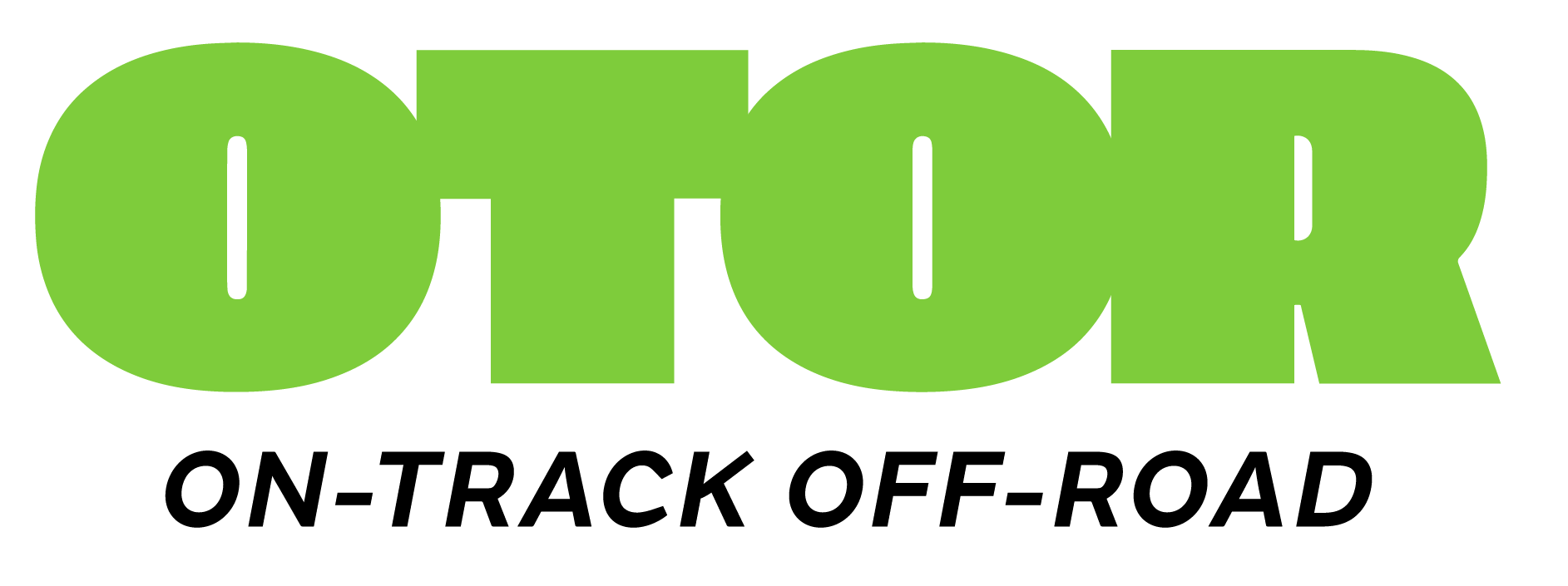For supercross and motocross fans and followers there are few better ways to ‘engage’ with the sport than through the PulpMX Show. The word ‘engage’ is apt because the lengthy weekly live broadcasts are as entertaining as they are insightful and frequently hot on the themes seen only a few hours earlier on stadium floors or AMA Pro National dirt. Catching part of the show is useful for hearing the often-candid words and thoughts of the latest riders but also personalities in the community and industry and the alternative (and outlandish) views of the cult characters that have developed a following thanks to their participation.
PulpMX is more than a decade in existence and crackled into life when the podcast phase was gathering more and more bandwidth. It’s undoubtedly an all-North American product both in tone and the practicality of virtually all participants being able to speak in their native language (hence the reasons the show’s format has not translated to Europe and MXGP on the same scale, despite the polished efforts of broadcasts like the MX Vice show). At the heart of it all though is the boundless Canadian who has amused and outraged. He has carved his own niche as someone with a lot of nuance and no scruples about bringing his ‘in the know’ status to a microphone.
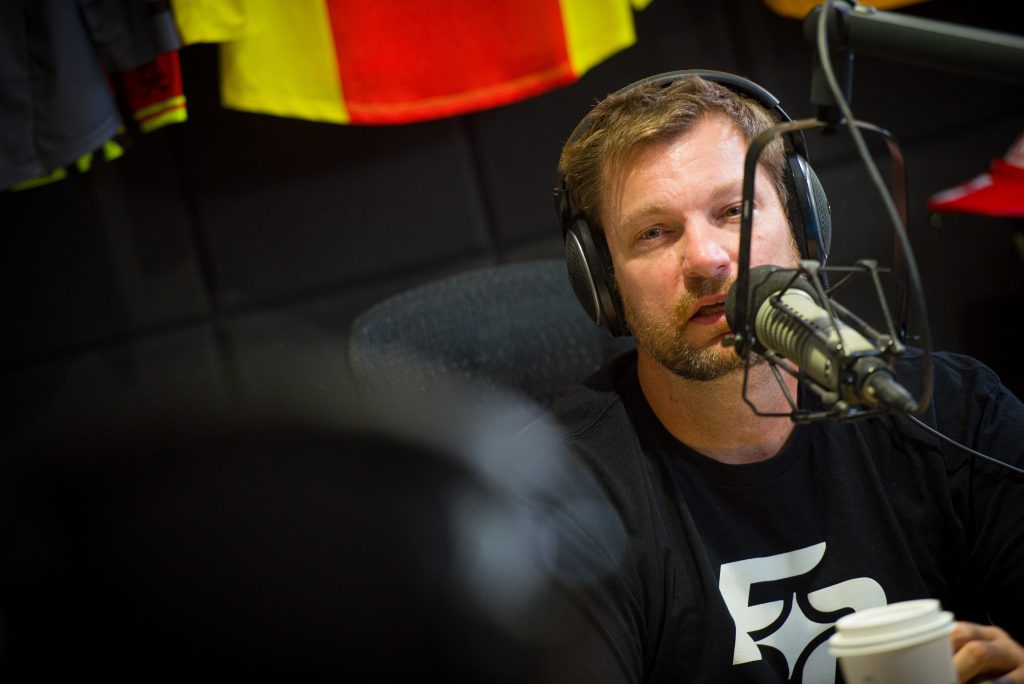
“Initially with Steve, when he was working for RacerX Canada, we’d never really seen anyone so unfiltered with their opinions and that was kinda funny and interesting,” says RacerX’s Jason Weigandt, a PulpMX regular and one of the most respected journalists on the U.S. scene. “We figured that one day he’d dig his own grave…and that didn’t really happen the way we feared it would. There were certainly a lot of phone calls and angry people…but Steve did something that I hadn’t seen anyone do and that was double-down and back-up what he’d said. He never apologised for his opinion.”
“People tend to think the behind-the-scenes of the sport is much more dramatic than it really is,” he added. “And most of the day-to-day grind is no different to anybody else’s. Steve lived it as a mechanic and managed to take that feel of ‘we all buddies, just doing what we love, not taking too much too seriously’ and broke down the barriers to take it front of the scenes. That’s the way his show has changed how we fundamentally consume media in this sport and that’s why, from all the other shows out there, his is the one that has enjoyed all the success.”
Success means numbers (in the tens of thousands per show) and a long list of sponsors. At the top of the pile is Fly Racing. Former racer and Fly’s essential link to the sport, Jason Thomas, has not only championed PulpMX but also formed the role as a foil to some of Matthes’ more ‘experimental’ and forthright views.
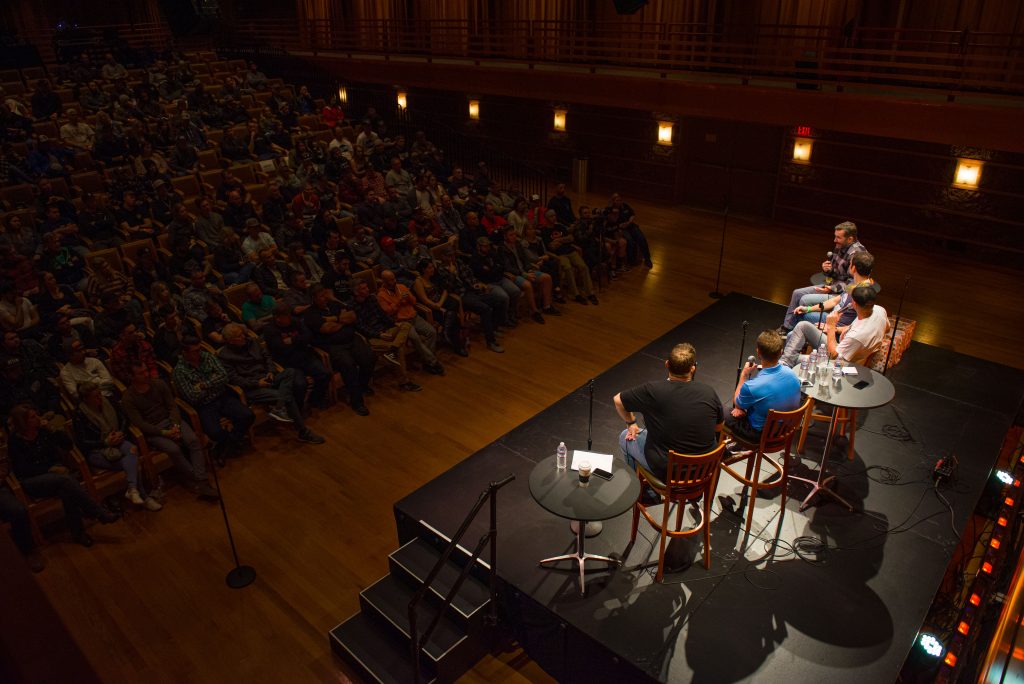
“I consider my role as giving an alternative perspective on what he might be talking about,” Thomas says. “Fortunately – and unfortunately – our opinions range quite widely on a range of subjects from politics, religion and supercross and motocross. Anything! I think it’s great we can maintain our friendship through those disagreements and the listener can probably identify with one of our opinions, which gives people something to latch on to. I think if you have very one-sided views then you’ll have a huge listener base that might disagree and turn-off. I’m really proud to be associated with Steve and everything he has accomplished. I think he has a long way still to go. He will become one of the loudest voices in supercross and motocross, if he isn’t already. Credit to him, it was his vision that got this going and it was his belief that made it what it is.”

PulpMX has the numbers but also the dynamic vibe to attract backers and interest. “He does a great job of promoting the brand and we now have a bit of an open-door policy with him where as long as an idea makes sense we’re willing to take a chance,” he adds. “He’s also been really loyal to us as well and we remember that. As a brand we always want to try and reach people in alternative ways instead of print advertising and standard old-school ways. We believe what Steve is doing with podcast, live radio and YouTube – which is the next big one for everybody – we want to be a part of that.”
“All the success has spouted imitators because people listen and think ‘all he does is talk moto and give opinions…I can do that!’ but the sources he has, the opinions and the knowledge is based on something much more tangible than someone who can only say ‘I’m a fan…’,” says Weigandt. “He has a baseline of how these teams and riders really work and I think a lot of people have forgotten that part.”

And from the man himself?
How did you manage to move from pitlane to podcasting?
I was a mechanic for a long time, eleven years, and I was getting burnt out. My rider, [Tim] Ferry, was getting hurt a lot and we weren’t having any success, and I wanted a change. I still loved racing. I was listening to a sports podcast in 2006-2007 – this was early podcasting – and I thought ‘it would be so cool to have something like this for moto’ and just have the means to do long-form interviews with people like David Bailey, Broc Glover or Rick Johnson. I left mechanic-ing to get a job at Parts Unlimited and I started thinking about the podcast idea. I am a huge fan of the sport and a historian on the side, I grew up reading all the magazines. So, I bought a book called ‘Podcasting for Dummies’! It didn’t seem that hard to do and I already had the contacts. I started the podcast for the RacerX Canada guys, as I was doing a little bit of work for them. This was in 2008. There was nothing like it in the industry and I enjoyed that. I had a laptop and about forty dollars of equipment and now I have ten thousand worth! I called up Chad Reed for my very first podcast because I knew him from working at Yamaha. People dug it. My wife is a huge Howard Stern fan and she was listening to his radio show every morning with the funny asides and the skits and segments, and again I thought ‘I could do something like this for moto…’ but it had to be live and I wanted to take phone calls from people. So that led to the Pulp Show and it just grew into this thing that I never thought it would. The early shows were quite different to what they are now. I had a partner called Paul Lindsey for the first spell. In terms of technology I had some long, long nights! Trying to get a streaming service to work with wifi in the house, six phone lines and all the different mixes that need to happen for people that are on mics or cellphones. I had some problems early on but I ironed all those out!

Were you pretty bad at the hosting and interviewing at the beginning? Did it take some training and discipline to get good? Or was it just natural off-the-bat…?
I would say it was quite natural because I was such a fan of these guys. To be able to call up Bailey or Johnson and say “what was it like…?!” was easy. I also knew some guys and knew some stories, so I just had to get them talking. I was definitely a bit rough in the beginning. I listened to some of the first shows last year and I was horrified! So, I’ve definitely got better and doing it for twelve years means you are bound to improve. I
Was it easy to get access to riders and people in the sport? Maybe they saw you as a mechanic or wondered what a podcast was…
Some guys were definitely like ‘what? We’re just gonna record a phone conservation?!’. I would tell them that the non-Pulp Show stuff wasn’t live, so it could be stopped or edited or the answer could be repeated. I never had a problem with access, thanks to being around a long time, so that wasn’t an issue. I feel that the part where I have to explain Pulp or podcasting is long over but in the early days I sure did.
When and why did PulpMX surge in popularity? Can you put your finger on it?
I can actually. It was a couple of things. Paul Lindsey was the first guest on the show and we didn’t quite see eye-to-eye and he was calling in from Colorado which made it quite tough. We lost a couple of sponsors. Actually, our very first sponsor was an online store that said they would come on for a year. Then they said they’d guarantee six months. Then they pulled their deal after six shows! This was our #1 sponsor, our title company! They said: “we’re not seeing it…” and I said: “but it’s only been six shows!” So, money became a thing. Paul and I parted ways but there was a guy called Kenny Watson who was living in Vegas who was an old friend of mine. He was a mechanic and was manager of the Hart and Huntingdon team, as it was then. Kenny is a character with a million stories. He is one of the most unique people I’ve met in my life. So, he came on and was saying some crazy things and some mad stories, and we started to get some traction. I remember going to Daytona and people were hearing about the show and asking me if Kenny really said some of that whacky stuff. That’s when I noticed that it was taking off. It really went wild with the Jeff Alessi ‘lazergate’ thing. This was show #139 and two years into it. Jeff Alessi had pointed a laser pen at Ryan Villopoto on the starting line [July 2013 at the Washougal AMA Pro Motocross National] and had been ejected from the track. I tweeted about it and Tony Alessi [Jeff’s father] lost his s**t at me at the race and the team owner, Mike Genova, said “I want to come on your show on Monday and explain what happened”. He also said Tony would call in. I’d known Tony a long time and his attitude at the races was crazy. So, they came on and it was unbelievable: a total PR trainwreck on their part. The show crashed our servers. I still get requests to this day for the show number! Ironically, they were in my studio a year ago and they were great! At that time and with that situation it wasn’t good. It was a big step for the show though.
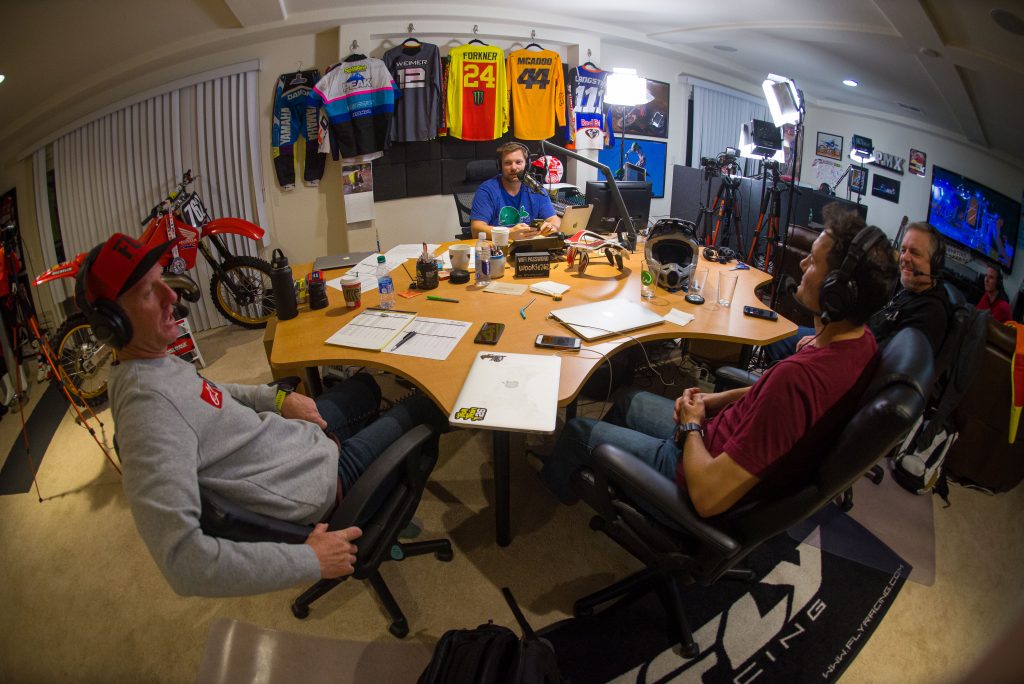
Speaking of the PR side, did you ever feel that you had to ‘hold back’ on the show? That some subjects or opinions would wreck any relationships or sponsor deals?
Not really. You know me! I say what I think. I never really had to do that. I’ve been in trouble and had my hand slapped a few times. People have been upset. But I’ve never had a big issue. I call things as I see them, and I think that’s why people enjoy what we do because you are going to get an opinion one way or another.
Do you sometimes have to play a role? Do you have to exaggerate things to create that interest… or think ‘what can I say to rile JT this time?’
Haha. I have a ‘Racetech rant of the night’ on the show and sometimes I’m not that angry at something but I will ratchet-it-up. I’m a Howard Stern fan as well and I want people to listen whether they agree or not. There is a fine line where you don’t want to do things that alienates people…but sometimes there are moments where I’m getting a bit more passionate about a subject or an event than, say, I really am.
The difficulty lies in the fact that Stern is probably broadcasting to several million people but moto is such a familiar and enclosed industry…
I would still say what I think! The last few years of the show have been really successful and I make a good living from it. It’s given me some freedom in my life to say whatever I want. It’s a refreshing place to be, in the industry.
What about copycats? People must have wanted to jump on the coattails, but the Pulp Show has endured and blossomed…
There must be a lot of them now but we’ve moved on. The latest thing was to add video. Actually, it was quite a while ago because we used to film the shows on a GoPro, sync the audio and throw it onto YouTube for people, and that was ‘OK’ but didn’t move the needle that much. Two years ago we starting investing in cameras, lights and the whole deal. So that’s taken the show to the next level. I feel that we have become a bit better and better as we go on, we discover stuff to make it a bit easier and smoother. There are a lot of other shows. I don’t listen to them because I want to do my own thing. Whatever those shows are doing is fine but I don’t tune-in because I don’t want to rob something! I’m competitive with other shows but I’m also confident that we are doing the best numbers. I think we are and by any kind of metric it seems like we are…so I know what we are doing is working.
Are you analytical? In the same way you might strip an engine are you looking at all the components of a show to see what works and doesn’t? Are you an audiophile for example?
Oh yeah. JT and Weigandt will bug me about it but I’m always trying to get the best equipment I can. I just replaced some material now that I didn’t need to replace. I bought a little remote podcast machine for the on-the-road shows. It could have been done another way but this thing was expensive and meant the production would be better. We add our numbers every four months with audio downloads and now video views and, no kidding, every four months it grows. We had one four-month segment where we were the same and it didn’t really jump up at all but there has been an increase every time over in ten years that’s great. Really cool to see.
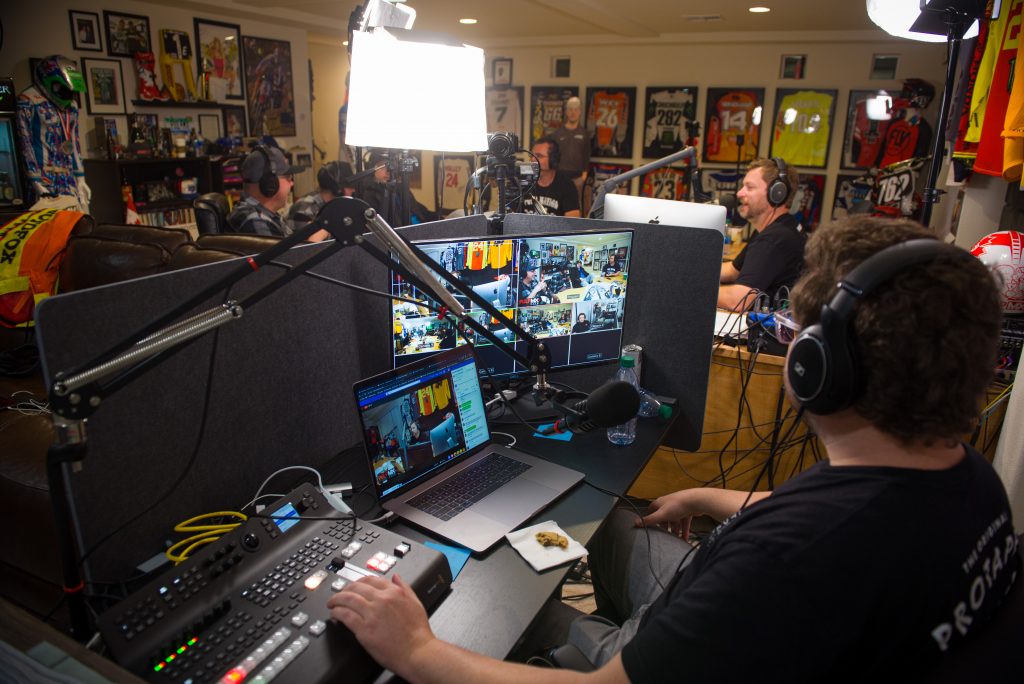
Is video frustrating? It seems weird that podcasts – which are normally a restricted visual medium – get such good views. You almost have to have that presence on YouTube these days…
I listen to a lot of podcasts. I never watch one! I don’t understand these people! Who wants to watch someone talking? But, people do! Lots of them. You and I are in the minority and I don’t understand it. It’s weird but it’s been a big success for the show. I guess I’ll give the people what they want but I normally listen when I’m on a plane, on a mountain bike ride, working in the garage wherever. I wouldn’t watch one and it’s bizarre that it seems to be where it’s going. One thing I think a lot of people don’t understand is how much work this stuff is. It’s a lot of hours. You don’t just sit behind a mic and push ‘record’. You gotta plan the show, get the guests lined-up, do you research and keep the show moving.
Explain some of the cult. There seems to be a raft of recurring names and characters and even a ‘show about the show’…
You do have to be a regular listener to keep-up sometimes right? My twitter and Instagram feeds are full of references from shows a long time ago! Or I’ll be yelling at JT about a burrito place. We get off-topic a lot! I get what you are saying. I think a listener just has to jump-in and figure it out and catch up for the ride. If you listen a lot then you’ll know all the inside jokes, about Weigandt being cheap and JT, his career and all the things that have happened to him. That’s what makes it special. Darkside has a wrap-up show. My show is four-five hours and I know it is a long time so I knew if I did an hour-long show with this guy who wraps-up mine then you can just listen to that if you don’t have the four-five hours! It seemed like a perfect idea.
It took me ten days to get through the Villopoto-Weimer show!
It’s long, right?! But then I have people who message me on a Tuesday saying ‘I’m done with the show and ready for the next one’.
What about some memorable shows or guests? For the right and wrong reasons…
We do something special for each ‘100’ show. So, for #300 I brought in [David] Vuillemin, Ferry and Reed and that was really cool. I flew them in, turned on the mics and let them bench-race. That was awesome. For #400 I had [Adam] Cianciarulo, Nick Wey, Villopoto and Weimer but the last two got a little loose just like they did for the late 2020 show! There was one when Kenny Watson just walked out on me. He didn’t like my argument and just threw the headset down and walked out. I was like ‘OK, he’s gone…’ and had to carry the show for the next twenty minutes. Stuff like that comes to mind. There have been some really good interviews. We had a young Ken Roczen on the show. He’d just come to America and I knew him a little bit from Europe. He was a great interview, he was really funny and his English was great. As you know. At the next race he said he’d had fun so I always felt that was pretty cool. Adam Cianciarulo and I are friends and we hatched the whole ‘Finding Stew’ video out on the show one night. We’ve had some dark stuff as well. Kenny Watson talked about his addiction issues over the years. It feels there has been a bit of everything.
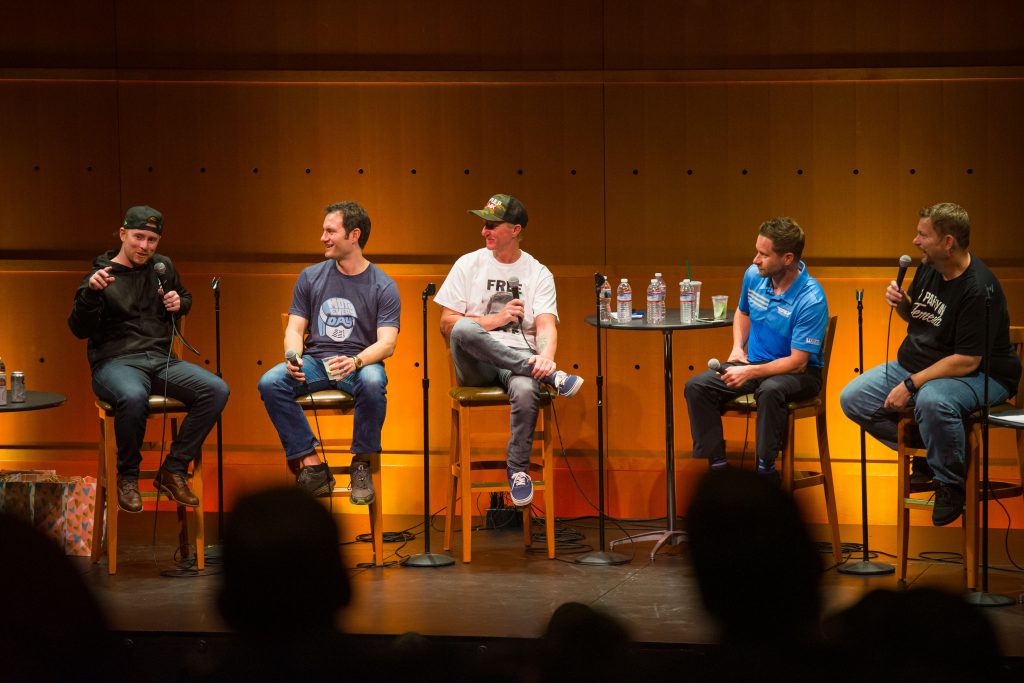
What about difficult riders? Anyone who just wouldn’t come on? Or, who was a challenge to interview?
Jason Anderson came on a couple of times and then decided he didn’t like me anymore and didn’t want to come back. I’ve had guys turn me down and others say they hate my guts and will never talk to me again and then a year-and-half later they are on the show! I think a lot of riders realise that quite a lot of people listen so I’m sure some don’t want to come-on and talk but they do anyway. Luckily, I’m in that place where it’s not too much of a problem to get people.
Who is a favourite then?
Adam is really popular and we’ll talk about sports generally or media relations. Zach Osborne is really good because he’s open and honest. He’s been on a lot. Kenny [Roczen] is harder to get but he will do it a couple of times a year. What I’m really proud of is that guys like Phil Nicoletti and Alex Ray were just names in the pack but in getting to be friends with them and knowing how funny and unique they are then being able to put these personalities into the show. They are hilarious for all the wrong reasons! But the listeners get into them, their social media following has grown and they become bigger names than what their results would have given. It’s cool! Everyone knows AC and Roczen but there are some really funny stories further back in the pack and I feel like we’ve done a good job getting those out to the world.
Lastly, how do you feel generally about podcasting? Is it a trend that will still grow and develop or has it peaked? Will you have to become a YouTuber?
It’s a good point. I think I am already on the way to be a YouTuber and I think you have to be these days. I feel that podcasting will keep growing but perhaps the next step – like for all media – is a paywall, right? I don’t know how magazines, newspaper websites and other people trying to make a living can keep giving away free content. I think you’ll see who really wants to listen to a podcast or not with the paywall. The numbers will go down for sure but in terms of podcasting I think it will just keep on getting bigger.
By Adam Wheeler
Photos by James Lissimore @lissimorephoto

